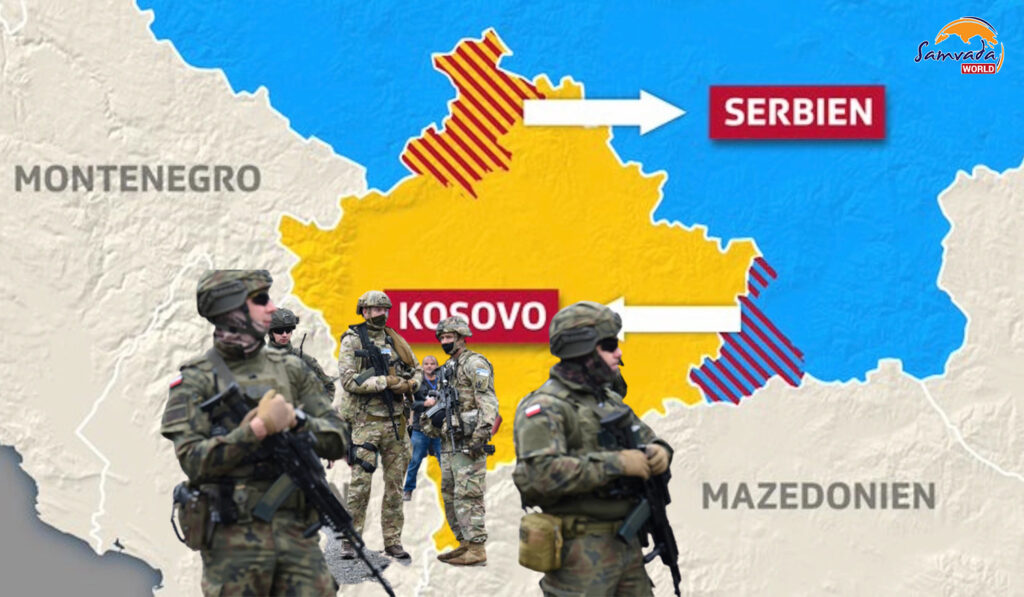The situation in Kosovo can be salvaged through strong security guarantees that can be provided by the West and EU to Serbia so as to maintain peace and security in the Balkans.

Background
The dispute over Kosovo is centuries-old. Serbia cherishes the region as the heart of its statehood and religion. Numerous medieval Serb Orthodox Christian monasteries are in Kosovo. Serb nationalists view a 1389 battle against Ottoman Turks there as a symbol of its national struggle. Kosovo’s majority ethnic Albanians, most of whom are Muslim, view Kosovo as their country and accuse Serbia of occupation and repression. Ethnic Albanian rebels launched a rebellion in 1998 to rid the country of Serbian rule. Belgrade’s brutal response prompted a NATO intervention in 1999, which forced Serbia to pull out and cede control to international peacekeepers.
Kosovo won independence from Serbia in 2008, almost a decade after a guerrilla uprising against Belgrade’s repressive rule. Serbia, however, still considers Kosovo to be an integral part of its territory and rejects suggestions it is whipping up tensions and conflict within its neighbour’s borders. Albanian-majority Kosovo declared independence with the backing of the West, following a 1998-99 war in which NATO intervened to protect ethnic Albanians. Around 50,000 ethnic Serbs living in northern Kosovo refuse to recognise the government in Pristina or the status of Kosovo as a separate country. They have the support of many Serbs in Serbia and its government.
Serbs in Kosovo want to create an association of majority-Serb municipalities that would operate with greater autonomy. Serbia and Kosovo have made little progress on this and other issues since committing in 2013 to the EU-sponsored dialogue.
The role of NATO, the EU and Russia
For more than 20 years, Kosovo has been a source of tension between the West, which backed its independence, and Russia, which supports Serbia in its efforts to block Kosovo’s membership in global organisations, including the United Nations. NATO has about 3,700 troops stationed in Kosovo to maintain the peace. The alliance said it would intervene in line with its mandate if stability in the area were jeopardized. The European Union Rule of Law Mission in Kosovo (EULEX), which arrived in 2008, still has around 200 special police officers there.
Russia, for its part, denied the Kosovo interior minister’s claims that Russia was influencing Serbia to destabilise Kosovo, saying that Serbia was defending the rights of ethnic Serbs.
Kosovo conflict and the Russia-Ukraine war
Well before Russian tanks and troops rolled into Ukraine in February, Russian President Vladimir Putin cited the breakup of Yugoslavia to justify his military operation in Ukraine. Putin claimed NATO’s bombardment of Serbia in 1999 and the West’s acceptance of Kosovo as a country created an illegal precedent that shattered international law and order. Putin’s argument, repeated several times since Russia annexed Crimea from Ukraine in 2014, followed this reasoning: If ex-Yugoslav republics and a Serbian province could become independent with Western backing and wars, why shouldn’t Ukraine’s strategic Black Sea peninsula and the rebel-controlled, majority Russian areas in the country’s east split off with Russian help? Western officials have vehemently rejected Putin’s argument, saying the NATO intervention in Kosovo was triggered by mass killings and other war crimes committed by Serbian troops against ethnic Albanians.
Although that wasn’t the situation in Ukraine before Russia’s full-scale invasion this year, Putin still relies on what happened in Kosovo as a precedent for sending troops in. He has cited Kosovo and Serbia many times since the invasion.
India’s Stand
India, Brazil, China, Russia, and Mexico are among the countries which have not recognised the independence of Kosovo. India has maintained that Kosovo’s declaration of independence contradicts UNSC Resolution 1244 which sought to establish an “interim administration for Kosovo” to solve the political crisis there at the time. Though India and Kosovo do not share diplomatic relations, India has not denied Kosovo’s existence. Many Kosovans wish to have trade ties with India which has been duly reciprocated by the latter. Last year, a trade body between the two states known as the India-Kosovo Trade Commerce Economic Office (IKCEO) was inaugurated in New Delhi.
Amid the Ukrainian crisis, the Serbian issue has added to the problems of the USA and the EU. Serbia being a Russian supporter, has not voted for any of the sanctions against Russia, which has annoyed the EU. However, the situation in Kosovo can be salvaged through strong security guarantees that can be provided by the West and EU to Serbia so as to maintain peace and security in the Balkans.
Aayush Pal is a freelance writer on contemporary geopolitical developments. The views expressed in his work are entirely his own.
